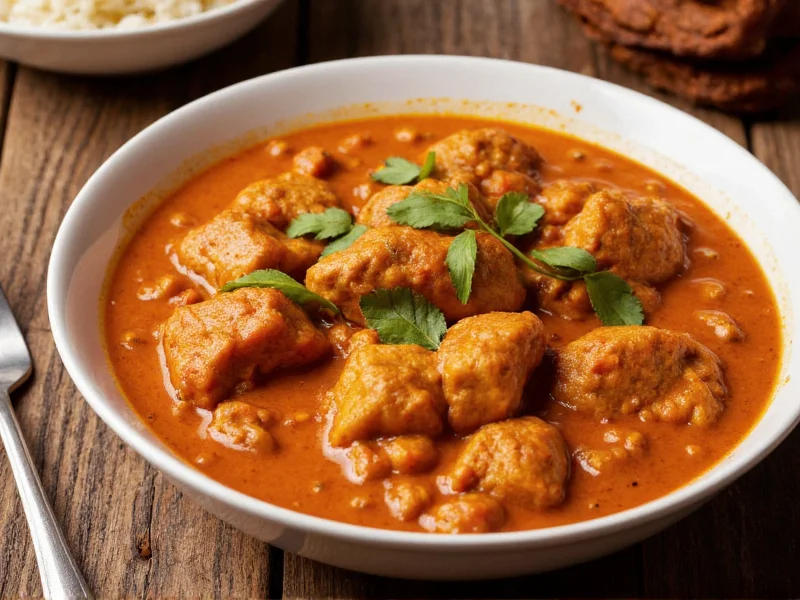When exploring whether chicken tikka masala qualifies as a curry, we must first understand what \"curry\" actually means across different culinary traditions. The term \"curry\" itself is a Western construct that doesn't directly translate to any single dish in South Asian cuisine. In India, Pakistan, and Bangladesh, specific regional names describe dishes rather than using the umbrella term \"curry.\" What Westerners call \"curry\" typically refers to any spiced, saucy dish with meat, vegetables, or legumes simmered in a gravy.
Defining \"Curry\": A Culinary Misnomer
The word \"curry\" likely originated from the Tamil word \"kari,\" meaning sauce or relish. British colonists in India adopted and generalized the term to describe the wide variety of spiced dishes they encountered. This linguistic simplification created a broad category that doesn't exist in South Asian culinary vocabulary.
| Term | Western Understanding | South Asian Reality |
|---|---|---|
| \"Curry\" | Any spiced, saucy dish | No single equivalent term; specific dish names used |
| Chicken Tikka Masala | Popular \"curry\" dish | British-Indian creation not found in traditional Indian menus |
| Curry Powder | Standard spice blend | Rarely used in South Asia; fresh spice blends preferred |
The Origins of Chicken Tikka Masala
Chicken tikka masala's history reveals why it occupies a unique space in the curry conversation. Most food historians agree it was created in the United Kingdom, likely by South Asian immigrants catering to British tastes. The popular theory credits Ali Ahmed Aslam of Glasgow's Shish Mahal restaurant in the 1970s, though similar dishes may have emerged independently in multiple locations.
The dish combines two elements:
- Chicken tikka - Traditional Indian preparation of marinated, grilled chicken chunks
- Masala sauce - A creamy, tomato-based sauce developed specifically for Western palates
This fusion created what many consider the UK's national dish, voted as such in multiple polls. The sauce's mild heat level and creamy texture made it accessible to British diners unfamiliar with traditional Indian spice profiles.
Culinary Analysis: Does It Meet Curry Criteria?
To determine if chicken tikka masala qualifies as a curry, we need to examine its components against common curry characteristics:
- Sauce-based preparation - Yes, it features a rich, spiced tomato and cream sauce
- Spice blend - Yes, typically includes garam masala, turmeric, cumin, and other spices
- Simmered cooking method - Yes, the sauce is simmered to develop flavors
- Regional authenticity - No, it's a British invention not found in traditional Indian cuisine
From a technical culinary perspective, chicken tikka masala meets the Western definition of curry as a saucy, spiced dish. However, purists might argue that authentic Indian cuisine doesn't categorize dishes this way. The dish's sauce contains curry spices but wasn't developed within traditional Indian culinary frameworks.
Cultural Perspectives on the Curry Question
The debate over whether chicken tikka masala is a curry reveals interesting cultural divides:
In the United Kingdom, where the dish originated, it's unquestionably considered a curry and appears on virtually every Indian restaurant menu under \"curry\" sections. British food writers and critics consistently classify it as such.
In India, many chefs and food historians don't recognize it as part of their culinary tradition. When available at Indian restaurants (primarily those catering to Western tourists), it's often labeled as \"chicken tikka masala\" without being called a \"curry.\"
This distinction highlights how food terminology evolves through cultural exchange. The question \"is chicken tikka masala a curry\" ultimately depends on whose culinary framework you're using to define \"curry.\"
Common Misconceptions About Chicken Tikka Masala
Several myths persist about this popular dish that complicate the curry question:
- Myth: It's an ancient Indian dish - Reality: It emerged in the UK in the 1970s
- Myth: All Indian restaurants serve authentic versions - Reality: Recipes vary widely, often adapted for local tastes
- Myth: \"Curry\" is a traditional Indian culinary term - Reality: It's a British colonial-era generalization
- Myth: There's one authentic recipe - Reality: No standardized recipe exists; preparation varies by chef and region
The Verdict: A Nuanced Answer to \"Is Chicken Tikka Masala a Curry\"
After examining culinary definitions, historical context, and cultural perspectives, we can provide a nuanced answer to whether chicken tikka masala qualifies as a curry:
From a Western culinary standpoint, chicken tikka masala absolutely qualifies as a curry. It fits the common Western understanding of curry as a spiced, saucy dish with meat. Restaurant menus worldwide categorize it under \"curries,\" and food authorities recognize it as such.
From a strict South Asian culinary perspective, the question is somewhat irrelevant since the term \"curry\" isn't used to categorize dishes in India, Pakistan, or Bangladesh. Traditional Indian cuisine has hundreds of distinct saucy dishes with specific regional names, but no overarching \"curry\" category.
Chicken tikka masala represents culinary evolution rather than strict tradition. As a British-Indian creation that has gained global popularity, it demonstrates how food traditions adapt and transform through cultural exchange. Whether you call it a curry depends largely on your culinary frame of reference.











 浙公网安备
33010002000092号
浙公网安备
33010002000092号 浙B2-20120091-4
浙B2-20120091-4